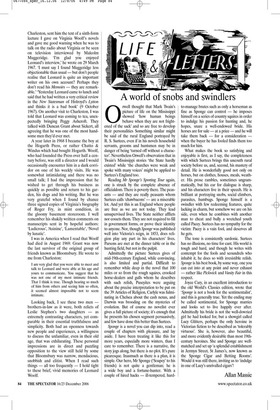O rwell thought that Mark Twain’s picture of life on the
Mississippi showed ‘how human beings behave when they are not frightened of the sack’ and so are free to develop their personalities Something similar might be said of the rural England portrayed by R. S. Surtees, even if in his novels household servants, grooms and huntsmen may be in danger of being ‘turned off without a character’. Nevertheless Orwell’s observation that in Twain’s Mississippi stories ‘the State hardly existed’ while ‘the churches were weak and spoke with many voices’ might be applied to Surtees’s England too.
Reading Mr Sponge’s Sporting Tour again, one is struck by the complete absence of officialdom. There is poverty there. The peasants — and they are really peasants whom Surtees calls ‘chawbacons’ — are a miserable lot. And yet this is an England where people are free as we are not today. They lead unsupervised lives. The State neither afflicts nor cossets them. They are not required to fill in government forms, or prove their identity to anyone. Nor, though Sponge was published well into Victoria’s reign, in 1853, does religion play any part in his characters’ lives. Parsons are met at the dinner table or in the hunting field, but not in the pulpit.
Admittedly the picture Surtees gives of mid-19th-century England, while convincing, is also limited and partial. Difficult to remember while deep in the novel that 100 miles or so from the rough squires, crooked horse-dealers and gulls whom he describes with such relish, Puseyites were arguing about the precise interpretation to be put on the 39 Articles of Religion, Carlyle was fulminating in Chelsea about the cash nexus, and Darwin was brooding on the mysteries of evolution. But of course no novelist ever gives a full picture of society; it’s enough that he presents his chosen segment persuasively, and few have done this better than Surtees.
Sponge is a novel you can dip into, read a couple of chapters with pleasure, and lay aside. I have been treating it like this for more years, especially more winters, than I care to remember. There is a narrative, the story jogs along, but there is no plot. It’s pure picaresque. Inasmuch as there is a plan, it is simple. Our hero, Mr Sponge (‘Soapey’ to his friends) is not quite a gentleman; he is a wide boy and a fortune-hunter. With a couple of hired hacks — ill-tempered, hard to-manage brutes such as only a horseman as fine as Sponge can control — he imposes himself on a series of country squires in order to indulge his passion for hunting and, he hopes, snare a well-endowed bride. His horses are for sale — at a price — and he will take them back — for a consideration when the buyer he has fooled finds them too much for him.
What makes the book so satisfying and enjoyable is first, as I say, the completeness with which Surtees brings this uncouth rural society before us, and, second, his mastery of detail. He is wonderfully good not only on horses, but on clothes, houses, meals, weather. His prose rambles, sometimes ungrammatically, but his ear for dialogue is sharp, and his characters live in their speech. He is brilliant at portraying snobs, social climbers, parasites, humbugs. Sponge himself is a swindler with few redeeming features, quite lacking in charm, but somehow we are on his side, even when he combines with another man to cheat and bully a wretched youth called Pacey. Surtees has no sympathy for the victim: Pacey is a vain fool, and deserves all he gets.
The tone is consistently sardonic. Surtees has no illusions, no time for cant. His world is tough and hard, and though he writes with contempt for the fools and scoundrels who inhabit it, he does so with irresistible relish. Sponge is his best book, by some way, one you can cut into at any point and never exhaust — rather like Pickwick and Vanity Fair in this respect.
Joyce Cary, in an excellent introduction to the old World’s Classics edition, wrote that ‘Sponge is not a book for the sentimentalist’, and this is generally true. Yet the ending may be called sentimental, for Sponge marries and looks set to live happily ever after. Admittedly his bride is not the well-dowried girl he had looked for, but a showgirl called Lucy Glitters, perhaps the only heroine in Victorian fiction to be described as ‘tolerably virtuous’. She is, however, also beautiful, and more evidently desirable than most 19thcentury heroines. She and Sponge are wellmatched and set up ‘a splendid establishment in Jermyn Street, St James’s, now known as the Sponge Cigar and Betting Rooms’. Would it was still there, inviting us to ‘indulge in one of Lucy’s unrivalled cigars’!
Allan Massie






































































































































 Previous page
Previous page